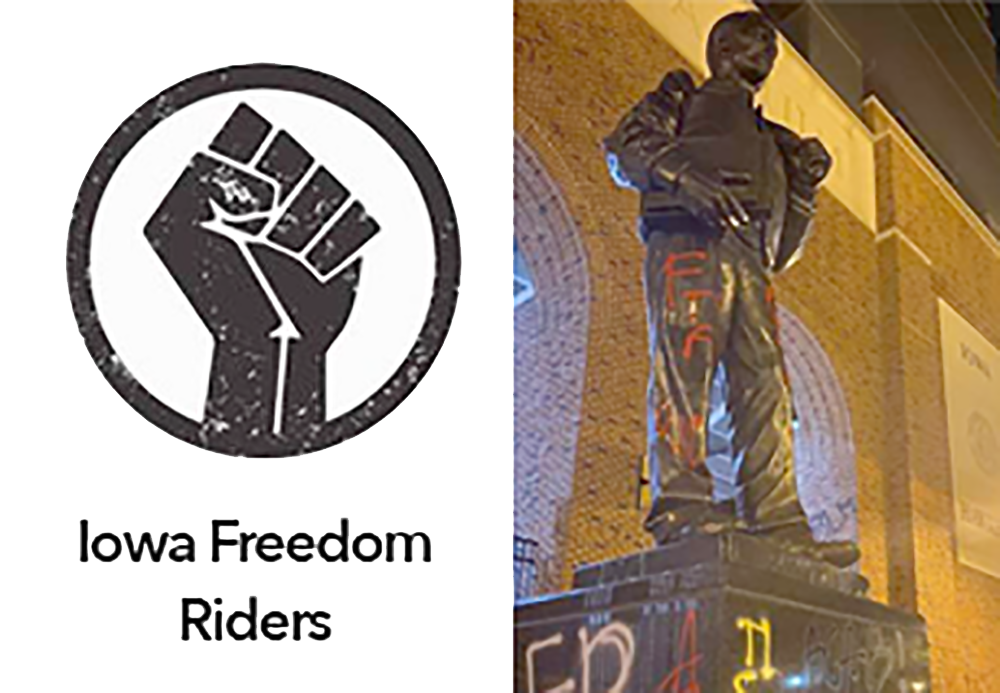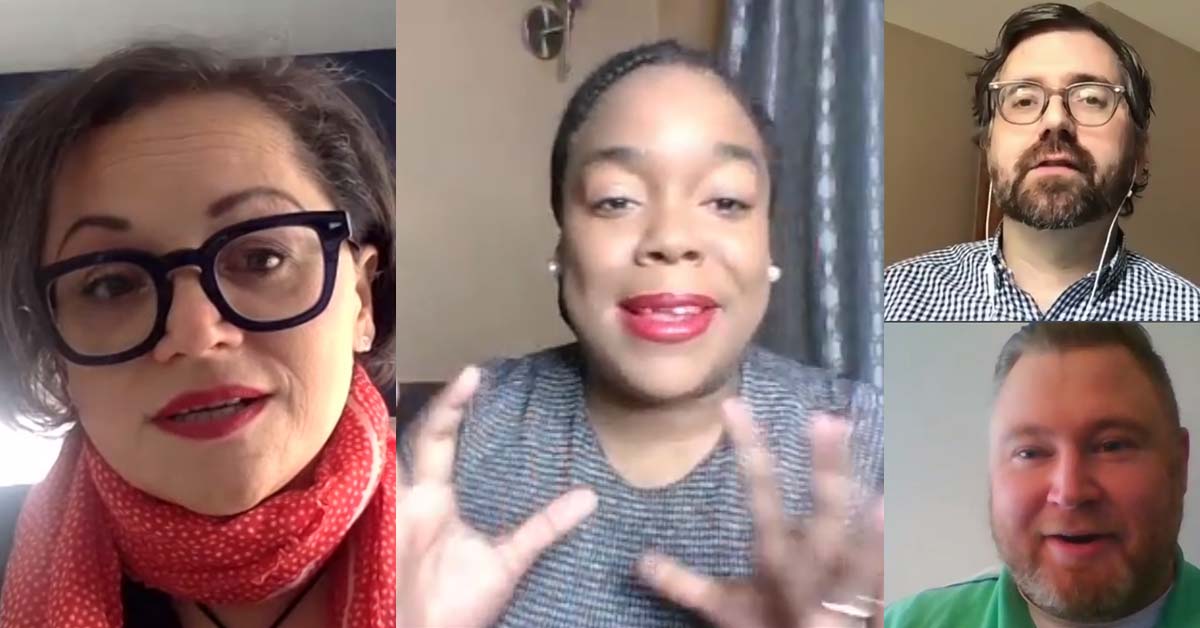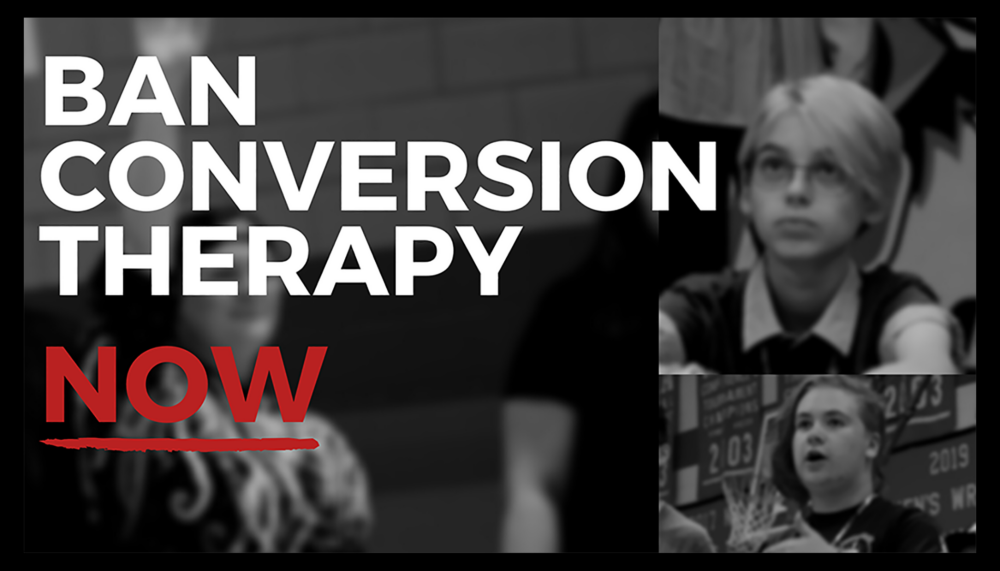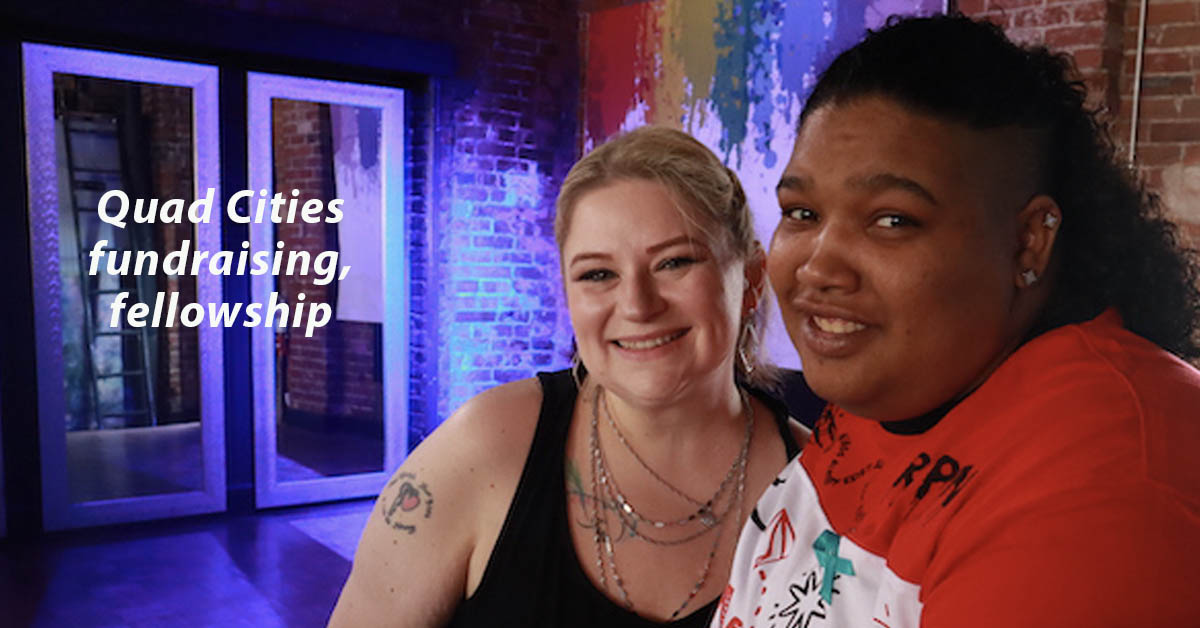Four nights of spray-painting and road-blocking throughout Iowa City, by a group now known as the Iowa Freedom Riders, has inspired the gamut of reactions: anger, support, frustration, sadness, and confusion. But protest leaders are now entering a new phase, which includes a detailed explanation of their demands for steps they believe local institutions should take to help end systemic racism. Read this column from Mandi Nichols, director of the Corridor Community Action Network, authorized by protest leaders to help educate the public on how the Freedom Riders’ requests are related to improving black lives.
Nearly everyone in the Iowa City area knows something about the recent nighttime protests. The movement is visible, loud, and permeating local mainstream media.
Yet, there are so many things people aren’t hearing about, so many stories that aren’t being told.
I’m not seeing anything about the many businesses, organizations, and individuals offering safe places to rest, as well as water and other supplies, outside of their own social media pages. I’m not hearing people talk about how incredibly well the protesters look out for each other, ensuring that everyone is adequately protected and cared for with masks, water, and food.
The sheer numbers in the streets make the unity behind this movement undeniable. That same unity exists in individual interactions — such as when someone was stopped by the Johnson County Sheriff’s department while dropping off supplies near the Pentacrest, and other protesters responded instantly, unloading the supplies and handing the driver cash.
While I had no doubts, the Iowa Freedom Riders’ support for their followers was made blatantly clear when they covered the rest of the cost of that tow the next day.
Anyone who has seen the spray paint or heard the chants, while failing to fully grasp the deep sense of community and urgency behind this critical movement, needs to hear these stories.
They also need to learn about the sound reasoning that is based on the reality of life — not only in the United States in general, but here in this town — that is behind the Iowa Freedom Riders’ demands. They are doing important work in getting the attention of a community and government that has ignored serious, systemic problems for far too long.
And it is working. The attention is there. People are responding, the media is responding, the city council is responding.
Yet ,the response is not enough, and the media needs to be more accountable about making sure that people are getting the information that is actually important.
These protests are demanding changes that are known to be associated with improving equity and decreasing racial disparities. They are demanding reasonable steps be taken to improve diversity and inclusion within every City department and the school board, as well as other institutions and businesses. Diverse and inclusive organizations have been shown to make better decisions, to be more innovative, and to have employees who are more engaged in their work and have better performance — all things this city needs.
The Freedom Riders’ demands also include “a clear and sensible plan for affordable housing.” According to the 2018 Out of Reach Iowa report, 40 percent of all Iowa renters are “housing cost-burdened.” It is one of many obvious issues that need to be addressed immediately.
Perhaps even more crucial is the protesters’ demand for a restructuring of the Iowa City Police Department towards community policing. Camden, New Jersey, made such a shift in 2013, and the results have been astounding, with a 95% decrease in complaints of excessive force since 2014.
This is critical, given the significant problem our country has with police violence.
Per capita, six times as many people die in police custody in the United States than in the United Kingdom. In 2018, police in this country fatally shot 992 people, during a year in which there were 11 such deaths in Germany, and 8 in Australia.
Not only do our officers kill far more people than those in other countries; they also kill Black people at a much higher rate than any other ethnicity: 30 per million of the population between 2015 and June 2020, compared to 12 per million of the white population.
Looking at all of those statistics, there is no acceptable excuse for not taking steps proven to decrease the use of excessive force, and to give an independent review board more power, like they are demanding the Community Police Review Board receive.
Related to the problems with our current policing system is the Freedom Riders’ demand that all security resource officers (SROs) be removed from public schools. SROs’ presence contributes to a school-to-prison pipeline that has a disproportionately negative impact on the Black community, with a higher rate of referrals to law enforcement and of school-related arrests.
In general, students in schools with SROs are five times more likely to be arrested than students in schools without them. Our children do not need to be arrested- they need to be educated.
Part of that education should include the Freedom Riders’ demanded anti-racist curriculum, including the complete knowledge of Black history in America. That is what we need to decrease systemic racism — not only in our schools, but in future generations.
The demand that Gov. Kim Reynolds decriminalize marijuana is exceptionally important in Iowa, the state that ranks fifth-worst in the nation for racial disparities in marijuana arrests.
Here, in our state, a Black person is 7.3 times more likely to be arrested for possession of marijuana than a white person, even though both groups use marijuana at the same rate. That is an unacceptable stain on our state that needs to be addressed now. Making possession of marijuana unarrestable would go a long way towards decreasing disparities in general arrest rates.
These protests are far more than the spray paint, the marching, and the traffic blocking that is receiving so much coverage. Those actions are simply the methods that were necessary to get the public and governments’ attention. It is now time for that attention to be focused on the demands and the logic behind them, on the needs of a community that is coming together in unprecedented ways to get their message heard.
Mandi Nichols is director of the Corridor Community Action Network. This column is approved by the Iowa Freedom Riders.






